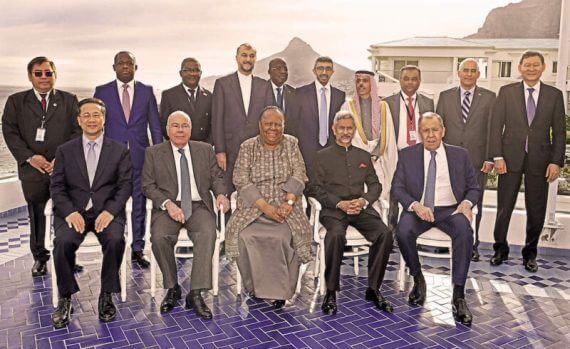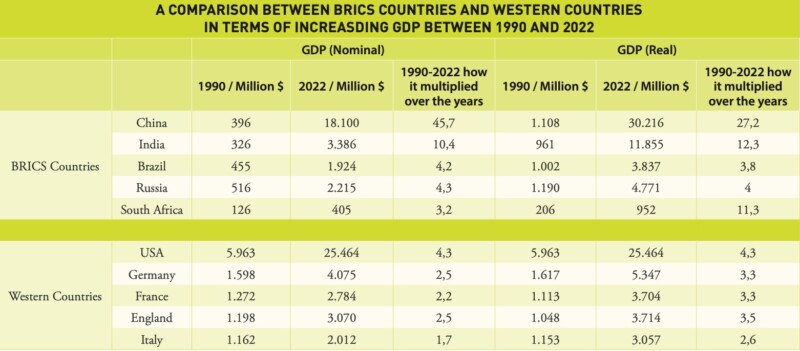W
e are at a historic turning point in terms of the power struggle in the international political system. The two devastating World Wars and the Cold War were major turning points in the twentieth century; however, in terms of shaking the power of “Western supremacy,” a very important undercurrent in the development of global politics, these developments did not have a significant impact.
World War I was largely a war between Western powers, and in its aftermath, the military and economic supremacy of the West continued to grow. World War II was also largely fought between Western powers and ended in the defeat of the challengers. Russia, one of the traditional European powers, challenged the United States and Western Europe under the Soviet regime during the Cold War, which also ended in defeat. It is generally accepted the current challenge to Western supremacy is a development that needs to be taken more seriously in terms of ending nearly 250 years of Western dominance.
If we look at where this challenge is coming from, Asia is clearly at the forefront, but Latin America and Africa have also raised objections to a global political system that reflects Western domination, albeit not as strongly. Let us examine the place of the BRICS, which brings together actors from these three continents, in the U.S.- and European-led international system; their challenge to this system; and the disadvantages they face in doing so.
Indicators of economic dominance
The first step in understanding the scale of the BRICS challenge should be a comparison of their positions in the global economy with those of the U.S. and the EU. In GDP terms, according to purchasing power parity (PPP), the main indicator of economic power, BRICS is the world’s largest economic bloc and one of its members, China, is the world’s largest economy.
The fact that by 2020 the five members of BRICS have reached a GDP (in PPP terms) larger than that of the United States and the 27-member-strong European Union combined shows that the organization has reached the capacity to have a serious impact on the future of the global economic and political system. There are now frequent reports that the BRICS members’ efforts to counter the United States’ increasing use of the dollar and the SWIFT system as a weapon could undermine the dollar’s position. Among the issues to be discussed at the BRICS summit in South Africa in August is the creation of a BRICS currency to counter the dominance of the dollar.
BRICS, whose current membership represents 41% of the world’s population, is seven times larger than the European Union and approximately 10 times larger than the United States. The fact that many countries have expressed their desire to become members of this union shows that BRICS is an alternative meeting place for countries dissatisfied with the global political and financial system.
BRICS is seen as an alternative to the G7. The group also operates a financial institution called the “New Development Bank (NDB)” as an alternative to the World Bank and the IMF, which are dominated by Western countries and other developed industrialized countries in close cooperation with them.
A look at the economic growth figures of the member countries over the past 30 years shows how China and India in particular have emerged as an alternative to the Western-dominated international system.
The figures in Fig. 2 show that the challenge to Western economic and political dominance, especially from Asia, is serious. However, a closer look at the challengers reveals that they all have significant weaknesses on this difficult journey—weaknesses that could determine the fate of the challenge. First, the relationship between China and India, the two main actors in this challenge, is highly problematic, and it is very difficult for these two nuclear powers, which have serious border issues, to cooperate in a manner similar to the U.S. and EU.
India prefers a policy of balance between the West and China: while it joins China in BRICS and the Shanghai Cooperation Organization (SCO), it acts together with the U.S. and its close allies in Asia, Australia, and Japan, in the Quadrilateral Security Dialogue (QUAD). India’s membership in QUAD is a development that should be added to China’s record of failures in the global power struggle.
It’s noteworthy to remember that a main reason why the United States emerged from the Cold War with the upper hand over the Soviet Union was its success in bringing powerful countries into its alliance network. Thus, the positions of actors such as India, Japan, Brazil, and Russia will be very decisive for the outcome of the power struggle between the United States and China.
From this perspective, one of Beijing’s weaknesses is its policy of pushing India towards the United States on security issues, rather than seeking a close alliance with the rising power. Meanwhile, China has already lost major economies such as Japan and South Korea to the United States. Apparently, China, now an economic giant, does not fully understand that it needs to take strong allies with it.
A series of shaken countries
Russia, another BRICS member, seems to be making much bigger mistakes than China in the global power struggle. The mistakes of the Putin government can be compared to the mistakes of Soviet Russia. Like the Soviet Union, Putin’s Russia is economically far behind the United States and the EU, and has resorted to excessive use of military force. As a result of Putin’s adventurous policies, beginning with the invasion of parts of Georgia in 2008 and extending from Syria and Libya to Ukraine, Russia today faces a similar predicament in Ukraine as the Soviets faced in Afghanistan.
The West’s economic and military support for Russian-occupied Ukraine, comparable to its support for Afghanistan but much more intensive this time, has shown Moscow the limits of its military power. In the face of U.S. and EU support, Russia is less and less likely to bring the war in Ukraine to its desired conclusion, suffering huge military and economic losses, on the one hand, and internal instability on the other, as the Wagner mutiny demonstrated.
While Russia has the world’s largest natural gas reserves by far and is one of the world’s largest oil exporters, it is bleeding on the front line in Ukraine—a front it opened on its own initiative. As a result, Russia must not be taken into account when thinking about the threats posed by the BRICS.
Brazil’s GDP, which stood at $2.47 trillion in 2013 when the instability began, shrank almost every year, falling to $1.48 trillion in 2020. Given that the domestic instability caused by social and political polarization and income distribution problems in the country has created an environment open to interference and manipulation by external actors dissatisfied with Brazil’s foreign policy line, it is clear that Lula da Silva, who will resume the presidency in January 2023, will have to tread more carefully in the global power struggle.
In addition to these weaknesses, another handicap of the BRICS countries in challenging the Western-dominated global political and economic system is that their military capabilities still lag far behind those of the United States and its allies. Although three of the five BRICS members possess nuclear weapons, the BRICS countries are not comparable to the United States in terms of military spending.
World history is full of examples showing that military power is as important as economic power in determining the fate of global challenges. The challenge to Russia’s military capabilities in Ukraine serves as the most recent example of this.
Recommended








